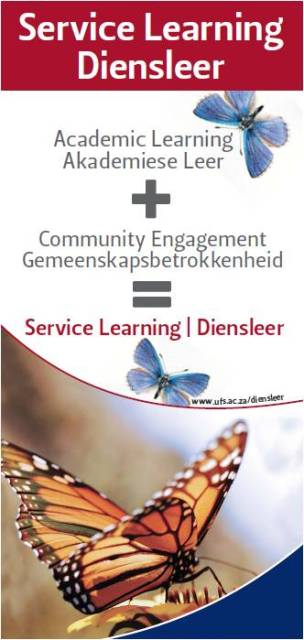Tell me, and I will forget. Show me, and I may remember.
Involve me, and I will understand.
(Confucius, 450 BC)

Service learning provides potentially life-changing learning experiences, developing students holistically by engaging their heads (cognitive domain), hands (psychomotor domain) and hearts (affective domain).
Ideals underpinning service learning include unconditional respect, an ethos of care and appreciation for the power of diversity.
For our students it becomes what Paulo Freire referred to as a "pedagogy of hope", allowing them to develop critical awareness of society and their role in it, and at the same time appreciating the unique contributions that they can make.
The integration of service learning with research provides unique opportunities for advancing the "scholarship of engagement", hence the growing number of postgraduate studies and scholarly publications by UFS staff members.
"Experiential learning is regarded as an approach where education, work and personal development are integrated" (Kolb & Fry, 1975)
"Experience plus reflection equals learning” (Dewey, 1963)
New from Oxford University Press Southern Africa
Osman, R & Petersen, N (Eds.) 2013. Service learning in South Africa. Cape Town: Oxford University Press Southern Africa.
Service learning in South Africa is the first South African textbook on service learning. It is aimed at South African students taking courses in service learning in degrees as diverse as Education (BEd or PGCE), the BSocSci, BCur, BEng and Law; as well as lecturers of service learning, education policy-makers and practitioners in non-governmental organisations.
A brochure and order form from Oxford University Press South Africa can be obtained here.
Chapter 7: Arguments in favour of service learning in the South African law curriculum, written by Adv Inez Bezuidenhout (Faculty of Law) and Prof Mabel Erasmus (Service Learning).